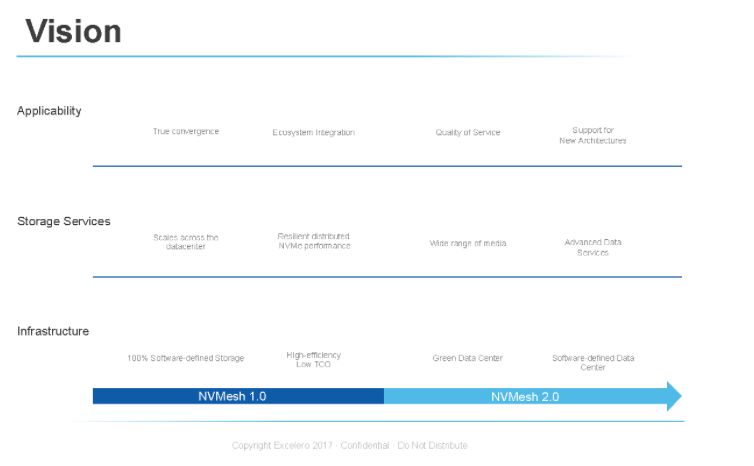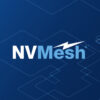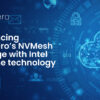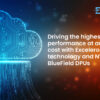Excelero was inspired by how Tech Giants like Amazon, Facebook and Google have redefined IT for web-scale applications, leveraging standard servers and shared-nothing architectures to ensure maximum operational efficiency and flexibility, and to provide the highest reliability. Their approach is referred to as the Software-defined Data Center (SDDC). Based on the same architectural principles and with the same objectives, Excelero has designed a Software-Defined Block Storage solution utilizing client-side services for scale-out applications.
Enterprises and service providers are seeking to optimize their infrastructures in the same way as the Tech Giants. For storage, this means they want to deploy unified scale-out storage infrastructures leveraging standard servers, also described as Software-Defined Storage. SDS, integrated with SDN, virtualization and newer architectures such as containers and their orchestration platforms completes the SDDC.
The promise of SDS is to provide flexibility and reliability – without compromises – for storage environments of any scale. Customers need the ability to deploy storage infrastructures starting with a few servers and scale out limitlessly with guaranteed reliability, predictable performance and seamless integration with their infrastructure and applications while maintaining operational simplicity.

Software-Defined Storage on standard servers has already gained traction for object storage, but that was quite easy as object storage is primarily used for active archives: scale and durability are the key requirements. All big server vendors see the potential of scale-out storage on standard servers and have embraced one or more object storage technologies as ISV/OEM partnerships. This enables them to sell more servers and services.
There is, however, a lot more potential when you enable customers to transform their primary storage infrastructures. Customers want to consolidate their current storage silos into unified, scale-out, flexible block storage pools on standard servers, also known as Server SAN. Consolidating storage tiers avoids the need to overprovision storage, do forklift upgrades and lowers the overall TCO. Server SAN solutions need to provide the flexibility to provision volumes for optimized application workloads. These applications are typically much more business-critical, have a much bigger impact on the TCO but need the functionality of traditional enterprise storage solutions.
Excelero’s Software-Defined Storage platform NVMesh® enables customers to design Server SAN infrastructures for the most demanding enterprise and cloud-scale applications, leveraging standard servers and multiple tiers of flash. NVMesh enables customers to pool flash over a network at local speeds. The primary benefit of NVMesh is that it enables true converged infrastructure by logically disaggregating storage from compute. It bypasses the CPU and avoids noisy neighbors, which is ideal for scale-out applications. This approach provides deterministic performance for applications and enables customers to maximize the utilization of their flash drives. Excelero’s NVMesh supports both converged and disaggregated architectures.
Maximizing operational efficiency, requires consolidation of storage silos and the ability to run multiple applications on a single storage platform. NVMesh was designed to leverage any underlying storage medium so applications can be provisioned with volumes that meet all application requirements (scale, performance, availability, reliability, efficiency and cost) and guarantee internal or external SLA’s. This can be done from a central interface (or API) that is very transparent and easy to use.
NVMesh was architected today to be compatible with technologies of tomorrow, such as containers, predictive analytics, machine learning workloads and blockchain architectures.




